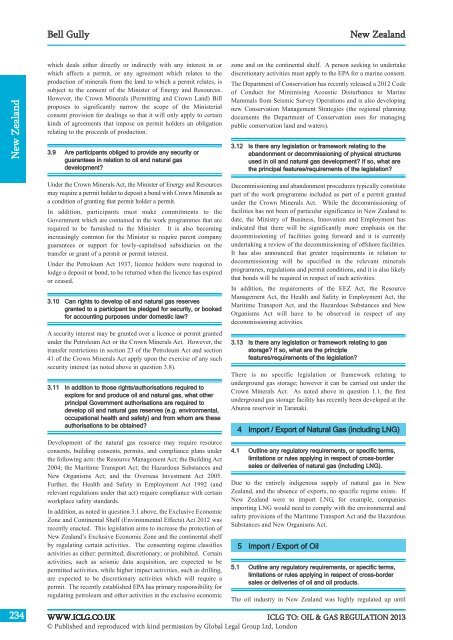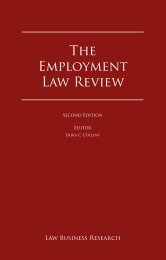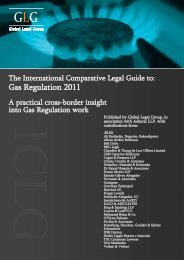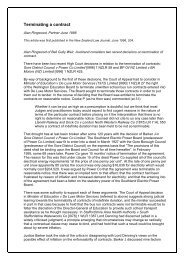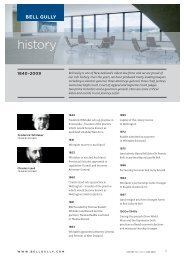Oil & Gas Regulation 2013
NZ Oil & Gas Chapter - The International Comparative ... - Bell Gully
NZ Oil & Gas Chapter - The International Comparative ... - Bell Gully
You also want an ePaper? Increase the reach of your titles
YUMPU automatically turns print PDFs into web optimized ePapers that Google loves.
Bell Gully<br />
New Zealand<br />
New Zealand<br />
which deals either directly or indirectly with any interest in or<br />
which affects a permit, or any agreement which relates to the<br />
production of minerals from the land to which a permit relates, is<br />
subject to the consent of the Minister of Energy and Resources.<br />
However, the Crown Minerals (Permitting and Crown Land) Bill<br />
proposes to significantly narrow the scope of the Ministerial<br />
consent provision for dealings so that it will only apply to certain<br />
kinds of agreements that impose on permit holders an obligation<br />
relating to the proceeds of production.<br />
3.9 Are participants obliged to provide any security or<br />
guarantees in relation to oil and natural gas<br />
development?<br />
zone and on the continental shelf. A person seeking to undertake<br />
discretionary activities must apply to the EPA for a marine consent.<br />
The Department of Conservation has recently released a 2012 Code<br />
of Conduct for Minimising Acoustic Disturbance to Marine<br />
Mammals from Seismic Survey Operations and is also developing<br />
new Conservation Management Strategies (the regional planning<br />
documents the Department of Conservation uses for managing<br />
public conservation land and waters).<br />
3.12 Is there any legislation or framework relating to the<br />
abandonment or decommissioning of physical structures<br />
used in oil and natural gas development? If so, what are<br />
the principal features/requirements of the legislation?<br />
Under the Crown Minerals Act, the Minister of Energy and Resources<br />
may require a permit holder to deposit a bond with Crown Minerals as<br />
a condition of granting that permit holder a permit.<br />
In addition, participants must make commitments to the<br />
Government which are contained in the work programmes that are<br />
required to be furnished to the Minister. It is also becoming<br />
increasingly common for the Minister to require parent company<br />
guarantees or support for lowly-capitalised subsidiaries on the<br />
transfer or grant of a permit or permit interest.<br />
Under the Petroleum Act 1937, licence holders were required to<br />
lodge a deposit or bond, to be returned when the licence has expired<br />
or ceased.<br />
3.10 Can rights to develop oil and natural gas reserves<br />
granted to a participant be pledged for security, or booked<br />
for accounting purposes under domestic law?<br />
A security interest may be granted over a licence or permit granted<br />
under the Petroleum Act or the Crown Minerals Act. However, the<br />
transfer restrictions in section 23 of the Petroleum Act and section<br />
41 of the Crown Minerals Act apply upon the exercise of any such<br />
security interest (as noted above in question 3.8).<br />
3.11 In addition to those rights/authorisations required to<br />
explore for and produce oil and natural gas, what other<br />
principal Government authorisations are required to<br />
develop oil and natural gas reserves (e.g. environmental,<br />
occupational health and safety) and from whom are these<br />
authorisations to be obtained?<br />
Development of the natural gas resource may require resource<br />
consents, building consents, permits, and compliance plans under<br />
the following acts: the Resource Management Act; the Building Act<br />
2004; the Maritime Transport Act; the Hazardous Substances and<br />
New Organisms Act; and the Overseas Investment Act 2005.<br />
Further, the Health and Safety in Employment Act 1992 (and<br />
relevant regulations under that act) require compliance with certain<br />
workplace safety standards.<br />
In addition, as noted in question 3.1 above, the Exclusive Economic<br />
Zone and Continental Shelf (Environmental Effects) Act 2012 was<br />
recently enacted. This legislation aims to increase the protection of<br />
New Zealand’s Exclusive Economic Zone and the continental shelf<br />
by regulating certain activities. The consenting regime classifies<br />
activities as either: permitted; discretionary; or prohibited. Certain<br />
activities, such as seismic data acquisition, are expected to be<br />
permitted activities, while higher impact activities, such as drilling,<br />
are expected to be discretionary activities which will require a<br />
permit. The recently established EPA has primary responsibility for<br />
regulating petroleum and other activities in the exclusive economic<br />
Decommissioning and abandonment procedures typically constitute<br />
part of the work programme included as part of a permit granted<br />
under the Crown Minerals Act. While the decommissioning of<br />
facilities has not been of particular significance in New Zealand to<br />
date, the Ministry of Business, Innovation and Employment has<br />
indicated that there will be significantly more emphasis on the<br />
decommissioning of facilities going forward and it is currently<br />
undertaking a review of the decommissioning of offshore facilities.<br />
It has also announced that greater requirements in relation to<br />
decommissioning will be specified in the relevant minerals<br />
programmes, regulations and permit conditions, and it is also likely<br />
that bonds will be required in respect of such activities.<br />
In addition, the requirements of the EEZ Act, the Resource<br />
Management Act, the Health and Safety in Employment Act, the<br />
Maritime Transport Act, and the Hazardous Substances and New<br />
Organisms Act will have to be observed in respect of any<br />
decommissioning activities.<br />
3.13 Is there any legislation or framework relating to gas<br />
storage? If so, what are the principle<br />
features/requirements of the legislation?<br />
There is no specific legislation or framework relating to<br />
underground gas storage; however it can be carried out under the<br />
Crown Minerals Act. As noted above in question 1.1, the first<br />
underground gas storage facility has recently been developed at the<br />
Ahuroa reservoir in Taranaki.<br />
4 Import / Export of Natural <strong>Gas</strong> (including LNG)<br />
4.1 Outline any regulatory requirements, or specific terms,<br />
limitations or rules applying in respect of cross-border<br />
sales or deliveries of natural gas (including LNG).<br />
Due to the entirely indigenous supply of natural gas in New<br />
Zealand, and the absence of exports, no specific regime exists. If<br />
New Zealand were to import LNG, for example, companies<br />
importing LNG would need to comply with the environmental and<br />
safety provisions of the Maritime Transport Act and the Hazardous<br />
Substances and New Organisms Act.<br />
5 Import / Export of <strong>Oil</strong><br />
5.1 Outline any regulatory requirements, or specific terms,<br />
limitations or rules applying in respect of cross-border<br />
sales or deliveries of oil and oil products.<br />
The oil industry in New Zealand was highly regulated up until<br />
234 WWW.ICLG.CO.UK<br />
ICLG TO: OIL & GAS REGULATION <strong>2013</strong><br />
© Published and reproduced with kind permission by Global Legal Group Ltd, London


